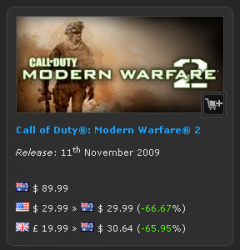Weekly News Roundup (15 January 2012)
Just as I predicted, this last week turned out to be quite a busy one. On top of the CES announcements, SOPA developments, there was also the latest NPD figures, for video game sales in the United States for the month of December. I wrote up the analysis of it yesterday, and the consensus seems to be that the video game industry is in trouble. Sure, December sales were quite disappointing, notably for Nintendo, but if you add up sales for both November and December for the other two companies, sales were actually up compared to a year ago. The Wii’s decline is not totally unexpected though, an innovative control system aside (which is no longer unique, or the most innovative), the other parts of the system, particularly the online and multimedia parts, are just not good enough any more. People now expect game console to do more, thanks to the healthy competition between the Xbox 360 and the PS3, and the Wii simply no longer delivers.
There’s plenty more to through though, so let’s not waste more time.

In copyright news, we start with an update to last week’s story about Reddit’s campaign to dislodge Rep. Paul Ryan for his SOPA support. With the campaign only just starting, it’s already had an immediate effect, with Ryan this week coming out with a definitive statement on SOPA, and promising to vote against the bill if it comes up in the house.
But the Pull Ryan campaign is not about to unveil a “Mission Accomplished” banner on an aircraft carrier, not just yet, as the movement seeks to expand its goals to force other legislators to take the same stance.
Recent developments may mean Ryan’s new stance may change once more, now that the backers of the bill, Rep Lamar Smith (who, this week, has been caught in his own copyright scandal, as his website may have committed a copyright violation in regards to the use of an image), and his Senate counterpart, Sen. Patrick Leahy, have signalled their intention to remove the DNS filtering provision of SOPA (and PIPA). There’s no denying this is a victory in the ongoing fight against SOPA, but it’s also a wise political move by Smith and Leahy, by removing the most controversial section of SOPA, the one area in which there seems to be universal opposition to (apart from the likes of the MPAA, of course, which came out defending DNS filtering). And in typical Washington fashion, the door was left open for DNS filtering to be put back in, at some later time when people might not be as worked up about SOPA as they are now.
In other words, the fight against SOPA continues, because as bad and dangerous as DNS filtering is, the other parts of SOPA (and PIPA) aren’t much better either. Even with DNS filtering removing, the bill would still give the government, and the entertainment industry, way too much power to take down websites, block IP addresses, sue website owners, financially assault websites, and force search engines to censor the Internet. Don’t be fooled by this latest back down – the fight must continue!

The White House replies to petition calling for opposition to SOPA, with vague messages of support for the anti-SOPA movement
In late breaking news, which I’ll cover in more detail next week after some more careful analysis (hah!), remember that petition that more than 50,000 people signed on the White House website asking for SOPA to be opposed? The way the White House’s petition website worked is that, if a certain number of signatures were recorded, the White House promised they would release an official statement on the petition topic. And just today, the White House did just that. Some sections of the media have already reported this as a big win for the anti-SOPA movement, but having quickly read the response, it’s not exactly an overwhelming rejection of SOPA, nor is it a promise to veto the bill by the President’s office (and to be fair, neither of these responses was likely to be forthcoming from a White House that has been pro-copyright from day one). The only part of SOPA that the White House clearly comes out against is ironically the part that has just been removed – the DNS filter provisions. The direct quote from the response on DNS filtering is as follows:
Our analysis of the DNS filtering provisions in some proposed legislation suggests that they pose a real risk to cybersecurity and yet leave contraband goods and services accessible online. We must avoid legislation that drives users to dangerous, unreliable DNS servers and puts next-generation security policies, such as the deployment of DNSSEC, at risk.
The rest of the response provides only vague clues about the White House’s official position on SOPA, with promises to continue “vigorously defending an open Internet based on the values of free expression, privacy, security and innovation”, but also containing phrases like “existing tools are not strong enough to root out the worst online pirates beyond our borders”. For what it’s worth, the organizer of the petition and random signers are being invited to a conference to discuss the issue further, a bit of good PR, but the cynic in me still believes one or both of SOPA and PIPA will get passed, with most of it intact, and once the storm blows over, the rest will get added back in.
But if the SOPA impasse continues, Sega may have found a new way to solve the problem: do a hard reset! That was the answer given to a gamer via email when he asked Sega what their position on SOPA was, you know the generic tech support answer for solving an unknown problem: reboot. It’s unfortunate that Congress and the Senate can’t be rebooted, not until November anyway.

This is the mysterious image that now appears on the home page of righthaven.com, after it was sold at auction to pay off the firm's debts
In the latest Righthaven development, the firm’s domain name has been sold for $3,300 by the court appointed receiver to the Switzerland based Stefan Thalberg. The domain name now points to a website with the intriguing title “Take Back the Right(Haven)”, and with the even more tantalising hint (which can be viewed via the HTML source code) of “Does your current provider possess a spine?”. Time will tell what it all means. Meanwhile, more of Righthaven’s assets will be put up for auction soon, as the appeals court rejects the firm’s last minute pleas for mercy.
Last week, I reported on the way the MPAA report piracy losses, and how they may be double or even triple counting losses based on figures that were already exaggerations. The MPAA strikes back this week, by claiming triple counting is a perfectly reasonable way of counting piracy losses, and once again compared piracy to shoplifting. The MPAA also attacked tech blog Ars Technica for ‘Challenging Efforts To Curb Content Theft’, which might just become illegal if SOPA is passed. Of course, blogs like Ars Technica, TorrentFreak, and even this one, do challenge efforts to curb piracy, but only those that are simply unreasonable – whether’s it’s intrusive DRM, or taking away people’s rights to free speech and privacy, or suing individuals for millions of dollars. The MPAA would be wise to not equate opposition to unreasonable copyright protection, to opposition to all copyright protection, because if they come up with a reasonable model to reduce piracy, for example, by making content more available, with less restrictions, and at the more reasonable price, the kind of things that people have been calling for, then we would not oppose them. And it’s exactly this kind of hyperbole, the “you’re either with us or against us” attitude, the “billion dollar” worth of damages that they keep on quoting (despite their rebuttal clearly stating they know exactly what those figures they keep on quoting actually means, that they are used as a measure of change in activity, rather than actual estimated losses), the use of the term “theft” when “potential lost sale” is a much more appropriate term (theft, including car theft and shoplifting, usually doesn’t leave the original item untouched), which makes people dismiss the industry’s attempts to find a solution to the web piracy problem. But maybe the truth is just not as sexy, but rather paints a picture of a well off industry that creates most of its own problems by being too reluctant to embrace change (remember when the MPAA came out comparing VCRs to the Boston Strangler, or when the RIAA said home taping would kill the music industry?).
And ignoring research which doesn’t fit into their agenda isn’t helping either. When NBC Universal hired research firm Envisional to conduct research on the effects and causes of web piracy, the firm came up with some conclusions that did not fit into the usual message about web piracy (in that web pirates are criminals, robbing the poor old struggling entertainment industry of money and jobs). They subsequently chose to cherry pick the parts of the research that they did like, so they could continue on with their Chicken Little “sky is falling” scare campaign, ignoring the most poignant aspects of the research results. What Envisional found was that the industry themselves were to blame for a lot of the problems associated with web piracy, such as the lack of legitimate content, the lack of support for overseas markets, and pricing problems. And at the CES, Envisional’s head of piracy intelligence, David Price, reiterated the fact that the industry has to do a lot more before it can blame everyone else for their woes. Price cites Netflix as the right way to combat piracy, as it’s already had a huge effect on the number of people using BitTorrent networks, but only in the United States where the service has only been available until recently. Netflix, just like iTunes, has come about by not fighting the Internet, but by embracing what it brings, and it’s interesting that neither solutions were industry created solutions, but comes from the same tech sector that the entertainment industry now want to curb via legislations such as SOPA. The industry’s fear of change has only benefited those that dared to innovate, it seems.
And it’s not just fear, but greed also, that’s contributing to their downfall. Instead of making legitimate content as widely available as possible, for reasonable prices, movie and TV studios have tried using DRM, region controls and other methods to divide up the world into multiple markets, so they can extract as much money from each market as possible. While this brings them more money in the short term via exclusive and timed deals, the real effect is that some consumers no longer have the legal option to obtain new content in timely fashion, and at a price that’s fair. For example, here in Australia, we have to wait months for new episodes of TV shows to get down here, and for games, we have to pay double or sometimes triple the prices people pay in the US or the UK. Before the Internet, people simply just had to put up with this. But there are so many choices now, and the so the real long term effect of their short term policies has been to push people toward these alternatives. VPNs allows Australians to access US content faster and cheaper, while overseas shopping websites allow imports at reasonable prices, taking away business from local retailers. And of course, there’s piracy, illegal as it may be, but still an alternative for many.
And things like DRM, region control, and even legislations like SOPA, have been the industry’s response to people’s acceptance of alternative choices, and the industry continues to hamper the new legal alternatives (such as having release delay windows for Netflix and Redbox) under the guises of fighting piracy. All in an ultimately vain effort to protect their dying business models, by attempting to put the genie back into the bottle, by rolling back innovation.

At the end of the day, money talks (as we stealthily move the discussion to the high def section). DEG (The Digital Entertainment Group)’s latest home video figures confirm exactly what I’ve just been talking about, that the Internet has drastically changed the way people consume content, and it’s only going to get “worse” for the industry if they do not adapt. Digital distribution revenue was up 55% for 2011, while physical media sales were down 13% – the industry’s revenue as a whole declined 2%. The revenue now earned by the likes of Netflix and Redbox could have easily been retained by the studios themselves, if only they had the foresight to see the potential of the Internet.
And even when the industry tries to innovate, like with UltraViolet’s cloud based movie storage, their own greed and insecurities are again their biggest enemy. UltraViolet, something that I think almost everyone agrees is a good idea on paper (the ability to buy a movie, as opposed to the media it comes on, and having a cloud stored copy that you can download or stream to your multiple devices), has been crippled by DRM, with each studio greedily attempting to promote their own distribution service, as opposed to working together on a single platform to make it easier for consumers. Just the fact that Disney is going out on their own and coming up with their own digital locker service, as opposed to joining the UV coalition like the other five major studios, shows how insecure and greedy they can be. It’s not exactly Blu-ray vs HD DVD, but it may actually be worse, with each studio preferring their own distribution service for UV (or their own version of UV), whether it’s WB via Flixster, Sony via the PSN (maybe), or the unknown studio that has just teamed up with Amazon – when the sensible solution is to use Netflix (and iTunes, if only Apple could have been convinced to join the UV coalition) or to come up with a new distribution service all UV partners would use. Netflix, sensing the confusion, may actually be withdrawing from the UV coalition, possibly to pursue their own version of the service (which all the studios will probably have to use when they’ve managed to destroy UV due to their own selfish interests).

Samsung's new Blu-ray player will be able to "convert" discs to digital, on the UltraViolet platform
Still, UltraViolet was a big topic at the CES. The most interesting announcement so far, other than Amazon’s participation, was the Samsung Blu-ray player that would somehow convert discs to digital. People can insert their favourite movie, and through a couple of clicks of the remote, buy or redeem the UltraViolet version, with technology that would be able to tell the difference between a legitimate store bought version, and rental/pirated versions. I don’t think charging people for yet another version of a movie they already own would be that popular, since I think if the best idea behind UltraViolet was the one that allows people to finally buy movies, instead of a version of the movie on a particular media. In my opinion, people who already have a legitimate DVD or Blu-ray should be given a free copy in the UV cloud. This may be hard to achieve though for existing discs, since many lack an unique identifier that can prevent a group of people sharing a single store-bought copy, and then getting the UV version without paying for the content, but surely this should be possible for all future copies pressed. Just add an unique identifier for each disc that can be linked to your single UV account (with each UV account being able to support multiple devices you own/have access to), and once that disc is inserted, the Blu-ray players reads the identifier, automatically registers online with your UV account, and your UV copy is available to use. It shouldn’t be any more difficult that that, really.
Make it easy for the consumer, and the money will come.
And on that note, we come to the end of another WNR. Hope you’ve enjoyed this one, and see you next week.

